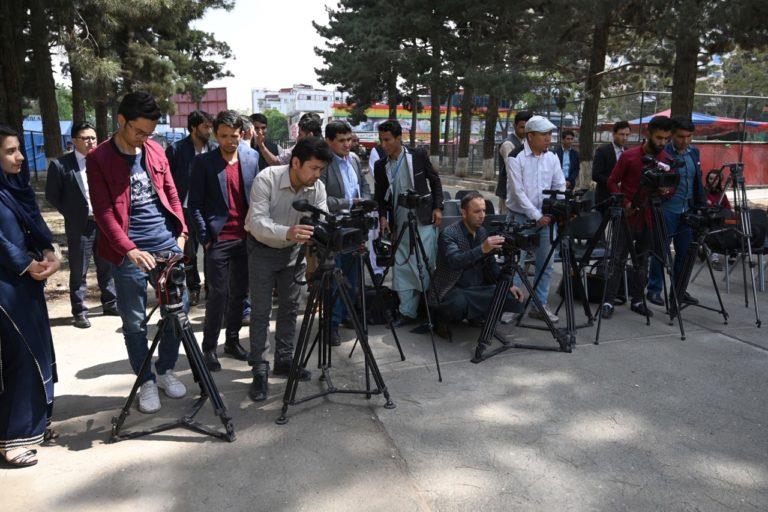
AFJC Calls On Taliban To Revive Access To Information Laws
FILE: Afghan journalists and media practitioners.
Kabul, Afghanistan – Honoring the World Media Freedom Day on Tuesday, Afghanistan Journalists Center (AFJC) expressed“deep concern” over the increasing number of media practitioners being arrested throughout the country, said AFJC in a written statement to Khaama Press.
The center underscored the sudden collapse of the media outlets since the Taliban takeover last August, warning of the“consequences” such a process could bring in the country.
“On this day, the Afghanistan Journalists' Center expresses its deep concern over the increase in the number of arrests of journalists and media workers and the sudden collapse of the media in the country, and warns of the consequences of this process,” said AFJC in a statement.
Statistics from last 12 months by the AFJC show at least four journalists and media practitioners have lost their lives in Afghanistan: three as a result of two ISIS-affiliated explosions in Kabul and one person during coverage of the war between the Taliban and former government forces in Kandahar.
The report also showed about 130 other incidents against journalists and media practitioners, where about 90 cases were short and long-term detention up to a month, including violence and threats.
Most of these cases have been recorded during the past 8 months, which reflects on the Taliban leadership in Afghanistan since last August, according to the statement.
Meanwhile, hundreds of male and female journalists have left the country since the fall of the Islamic Republic on August 15. And, more than half of about 600 media outlets – mainly the radios, televisions, and print publications – were shut down due to financial crisis the sudden brought about to the companies.
Currently, about 30% of other media outlets that have been operating despite the odds are on the verge of financial collapse, forcing many others to operate intermittently for a few hours a day or week.
Aside for the unprecedented increase in threats and intimidation of journalists and media workers, findings by the AFJC shows the show access to information in the country has been severely restricted.
The announcement by the Islamic Emirate to approve the law on mass media and to try to revive the Media Complaints Commission as a step towards preventing arbitrary actions against journalists and investigating complaints against journalists through the law, should be considered, the report said.
While recent efforts by the Taliban government to appoint a spokesperson for respective ministries and efforts by the Ministry of Information and Culture facilitate access to information seemed promising, AFJC's findings suggest their move were rather less productive than expected.
- Afghan Journalists Face Ever-Increasing Restrictions
Considering the record high number of violence against media practitioners during the Taliban rule in past eight months, the Afghan Journalists' Center called on the Islamic Emirate officials to make a firm political commitment and enforce laws, asking the current government to reconsider the law on mass media and access to information.
“…There is a need to revive and reactivate the joint government-media committee, which was established during the Islamic Republic to deal with security issues and incidents of violence against media employees,” as the statement read.
Global Attention on Increasing Restrictions against Afghan ReportersThe ever-increasing restrictions against Afghan reporters has drawn global attention, with the United Nations (UN) and the Committee to Protect Journalists (CPJ) decrying the arrests, demanding the Taliban government to stop harassing local journalists and stifling freedom of speech through continued threats, arrests, and intimidation.
“The Taliban must immediately … stop detaining and intimidating members of the Afghanistan press corps,” a statement from CPJ said, as Aljazeera reported.
Meanwhile, the UN Mission in Afghanistan expressed“concerns” over the ongoing detentions of local journalists and“the ever increasing restrictions being placed on media in Afghanistan.”
“Time for the Taliban to stop gagging & banning,” the mission, known as UNAMA, said on Twitter .“Time for a constructive dialogue with the Afghan media community.”
On December 2021, Reporters Without Borders and the Afghan Independent Journalist Association said that 231 out of 543 media outlets had closed, while more than 6,400 journalists had lost their jobs since the Taliban took control of the government. The outlets closed for lack of funds, or because journalists had left the country, according to the report.

Legal Disclaimer:
MENAFN provides the
information “as is” without warranty of any kind. We do not accept
any responsibility or liability for the accuracy, content, images,
videos, licenses, completeness, legality, or reliability of the information
contained in this article. If you have any complaints or copyright
issues related to this article, kindly contact the provider above.

















Comments
No comment